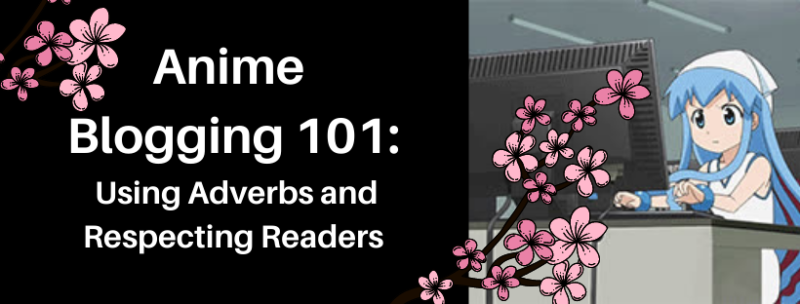
Adverbs add detail to verbs, adjectives, and other adverbs. Many grammar wonks tell us to cut adverbs unless they are necessary. I mostly agree (see what I did there?). Most –ly words are unneeded and weaken writing.
Rukia said quietly.
Rukia whispered.
Saying something quietly is the same as whispering. Whispered is a stronger word than said. Adverbs prop up mushy words, and often they are redundant. Completely overwhelmed. Can you feel overwhelmed in any other way? Stoked can replace extremely excited. Really good…how about great?
Expletives and the word very contend for first place in the uselessness contest. Very measures degree, but it lacks any sort of scale. My idea of very good differs from yours. Very good isn’t as good as great, but by how much? Rarely does very strengthen a word.
“You are very pretty!”
“You are pretty!”
The word very lends the first sentence a measure of doubt. It can read: “Of course, you are pretty!”. The second sentence feels like an off-the-cuff exclamation instead of a dodge. That is the trouble with very: often it feels like a dodge. “Oh, so I am not beautiful?” can well be a response for the first sentence.
Most of the time adverbs can be deleted without changing the sentence. Think of them as anime fan-service. Too much fan-service ruins a story, but some genres require a little. Mecha wouldn’t be mecha if it didn’t have the occasional giant robot fan-service camera pan. But too much gets old fast. Adverbs like extremely makes readers doubt your authority as a writer.
Ichigo is an extremely good example of a hero.
Ichigo is a good example of a hero.
The second sentence is more confident. Boom! Here is my opinion. The first sentence feels weak despite trying to be exciting. Excitement isn’t found in adverbs. If you want to excite the reader use strong verbs and tell a story:
Ichigo swung his sword, feeling it bite deep into flesh. His sister cowered behind him. He knew she couldn’t see the struggle, but it didn’t matter. I will protect her, he thought. The Hollow shrieked and lashed out with a twisted claw.
If Bleach’s Ichigo is an extremely good example of a hero, show it.
Avoid Hedges

Hedges are phrases that soften your thoughts. They evade. I think, In my opinion, It seems to me that, very are all words that hedge a thought. Consider these sentences:
I think Dragon Ball Z is the best anime.
Dragon Ball Z is the best anime.
Both sentences say the same thing. The first sentence lacks self confidence. It hedges, and it makes the writer the topic of the sentence. Readers understand the second sentence is your opinion. I think, It seems to me that, In my opinion pulls readers’ attention from the point you are trying to make and toward you. You don’t have to label your opinions as opinions. Express them. Lay them out and leave them to stand on their own. Readers like authors who believe in themselves and their ideas. Hedges undermine that relationship. They clutter:
It seems to me that anime has great storytelling potential.
Anime has great storytelling potential.
The second sentence reads more like a conversation. We speak in short sentences. Even the most long-winded story uses short sentences. Strange constructions like It seems to me that, I think that, or The fact of the matter is that are found in writing rather than conversation. They are wordy and clunky:
The fact of the matter is that reading manga requires different literacy skills than prose.
Reading manga requires different literacy skills than prose.
It seems to me that shonen has story telling problems.
Shonen has story telling problems.
The that structure is awkward. Most of us do not speak that way. We blurt thoughts. He is an idiot. Write as you blurt. Speaking of conversation, um, uh, and well are verbal ticks that can add humor and humanity, but they can be overused. Hedges using these verbal ticks can be useful.
Mugen is, uh, a samurai?
Mugen is a samurai?
In this case, the first sentence points out how Samurai Champloo’s Mugen isn’t a samurai. The hedge allows you to hook more explanation about how Mugen is an anti-samurai. The second sentence doesn’t give you any hooks. It acts like a statement of fact instead of an expression of doubt. Hedges can be useful when they act as hooks. While we often say um and well, using them in writing as frequently as we say them doesn’t work. It is, um, a little hard to, well, understand. A well-placed um or well can be funny or conversational, but it can be hard to place them. They require commas to separate them from the sentence.
Well, that episode sucked.
Um, can I get my time back?
Explaining bias isn’t hedging. Explaining gaps in your knowledge or opinions that influence your understanding is laudable. It helps clarify the environment for readers. It is good journalism. Everyone has bias and gaps in knowledge. Revealing yours will increase the reader’s confidence in you. It shows how you do not try to deceive.
Be confident and don’t worry about being wrong or people disliking you. Don’t be afraid of a reader correcting one of your bald statements. You want readers to do this. It shows they care enough to set you straight. It shows they are interested. Corrections are a signal of your success, and they call you to improve. So don’t hedge to avoid being wrong. Allow sentences to stand.
Don’t Talk Down to Readers

I am guilty of this. Pompous word selection and over-explanation insults the intelligence of readers. Sometimes this is a fine line to walk. When you write about an obscure anime, manga, or topic you have to over-explain a bit. However, you don’t want readers to say to themselves “I know already! Get on with it.” Repeating and rephrasing an idea over and over suggests the reader is stupid. I do it when I write my first drafts. Writing is messy, and I forget where I place ideas. But unintentional (and uncaught!) repetition can insult. Edit with an eye for repeating ideas. Trust your reader to understand or to go back and re-read a section. But also don’t beat yourself up when you miss repeating ideas. It happens.
Academics talk down because they are wrapped up in their field. As anime bloggers, we have to be careful too. Aggressive tone of voice is just as bad as stuffy, jargon laced academic writing. Expletive-heavy writing bludgeons people to get them to listen. “Hey! I am angry, and I am going to manipulate you to be angry too” is the tone such writing conveys. It does little to motivate people. I advocate persuading people using logic mixed with emotion. This approach respects intelligence.
Slang makes writing friendly, but it can talk down to readers too. Whenever I come across a slang-filled article, I either doubt the blogger’s qualifications or feel like the writer lacks respect for me. Such writers dumb down their messages. Fuck-filled writing has the same effect. Both say “if I don’t write like I think you speak, you won’t understand.” Your voice can use these in small amounts, but beware over-use.
If the author has a predilection toward utilizing verbose, dialectal lexicon in the pedantic struggle to assuage a fragile ego, we stop reading. Readers dislike authors that view them as stupid. Jargon does this. Simple phrases like you see, of course, and dear readers create a pompous tone too. Wrapping words in quotation marks looks pretentious.
Manga can be considered “literature.”
This can work if you are writing humor or sarcasm, but most of the time it makes you look “smart.”
Blogging isn’t formal writing, but the principles of formal writing still apply. Clarity helps people understand your thoughts. Grammar creates clarity. The words you choose create your tone of voice. As Henry Ward Beecher wrote, “All words are pegs to hang ideas on.”
References
Strunk, W., and E.B. White. The Elements of Style. Longman 4th Edition. 1999.



